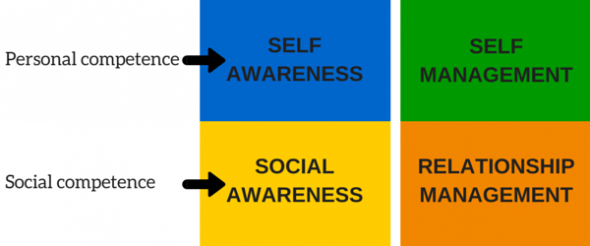Book – Emotional intelligence 2.0
By Travis Bradberry & Jean Greaves
For me emotions are one of the most important parts of individuality. That’s why my choice was this book. It turned out that it was the right one. The book is also part of the introduction of my PR lab class where we were given a test from this book. I found that I need to work on my EQ very seriously. So, we will begin with this book. I read many articles about emotions and dealing with them but the main problem is that when they come, you will never remember all these things from the/a book.
The book starts with a story of a surfer who was attacked by shark. It was description of the power of emotion and how important it is to understand and work with our emotions. There is also a big illustration how our brains connected with emotions. And the book gives recommendations to increase EQ.
- People with average IQs outperform people with high IQs 70% of the time
- EQ has zero correlation with IQ
- EQ accounts for about 58% of performance in most jobs
In comparison with IQ we can work on improvement of EQ. It’s a scientific fact that our first reaction to any event will be an emotional one, but only 36% of people are able to accurately identify their own emotions as they happen.
There is an opinion that EQ is a part of personality, but EQ is separate from personality and intellect, or IQ. Bradberry and Greaves explained research studies that described how important EQ is in daily living, even it impacts how you manage stress, how much money you make.
The book outlines several stages of action plan to increase emotional intelligence level after completing The Emotional Intelligence Appraisal and gives different strategies, which were designed to help you maximize self-awareness to create changes in life. The strategies seemed simple to me but at the same time they are very difficult to follow consistently. I think that in order to be emotionally intelligent you need time and many inside efforts.
The authors presented EQ framework.

After completing the test I found that I need to work on my self-awareness skills. With high self awareness we can understand ourselves well and what surroundings appropriate for us and how work with people. Very important leadership skills. I will focus on self-awareness strategies on which I need to work.
You should understand your emotions, not judge them for bad or good. When you act with emotions with other people you need to know about the long term effect of them. Do not forget about unpleasant emotions, in order to understand them you cannot ignore them and feel them physically. Another advice which was a surprise for me – to identify the exact people, situations, and surroundings that trigger your emotions, afterwards you will find the source of your reaction to these things. You should be objective to your emotions and observe them, take notes about them to understand them better, identify patterns, and track progress. There are some difficult things which I found in the book not to be fooled by a bad mood and a good mood, either which could overshadow your emotions. At the same time, you should not stop and ask yourself why you do the things you do. Many books suggest writing periodically and here I found the same advice – write down values in one column, and anything that you’re not proud of in a second column. The authors suggest to do that regularly in order to keep it mind and not to regret.
Additionally, your physical appearance and observation is also important. Putting emotions in books, movies, and music can offer further clues about your emotions. And last tip –take feedback from different people. Of course, most important thing is about stress – you need to know when you are under stress. Learn to recognize your personal physiological and emotional first signs of stress, and take time to rest or recharge before that stress piles up.
The books also presents specific strategies that will help you notice and interpret cues other people send you. These cues will give you some help in putting yourself in the other person’s shoes.
There are other strategies that help with improving relationship skills. Relationship management skills tap into the three other EQ skills. Self-awareness skills help to notice your feelings, self-management skills – to express your feelings and act accordingly and your social awareness skills is helpful to better understand the other person’s needs and feelings.
The last part of the book is devoted to questions that you cen use to start a meaningful dialogue and build your understanding of how the four EQ skills apply in daily living.
My general impression about book is that I have many things to do, to regulate my emotional part of life. It is a matter not only of time but also patience and motivation. When you have emotions you are not thinking about

